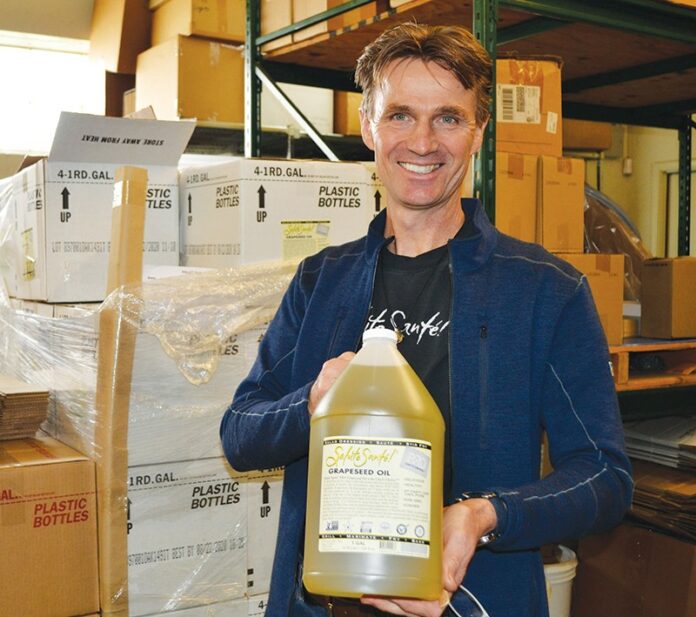Recently, a Napa gourmet food brand called Salute Santé helped me to clear the smoke around a little issue in the kitchen I was having. To wit, it was the smoke in the kitchen.
The culinary skills I picked up making post-collegiate stir-fries have served me well enough. I fry things. Hash browns. Tofu and rice. Veggie burgers—I even sear the occasional steak. When I want to go all gourmet, I toss some kalamata olives and sun-dried tomatoes with polenta. And fry that in olive oil.
Sure, I’ve heard that fried food is bad, but somewhere along the way I heard extra virgin olive oil is good. I’d be better off using it only as a finishing oil, Salute Santé owners Nanette and Valentin Humer tell me. The problem isn’t just that oil labeled extra virgin is often unscrupulously stretched with lower quality oils—as a 60 Minutes report detailed—but that it’s not so great when it goes up in smoke.
Nobody told me. Did they tell you? Grapeseed oil has a higher “smoke point” at about 485 degrees Fahrenheit, according to the Humers, who have been quietly selling Salute Santé to top chefs for nearly 25 years.
At the office, tucked in a rambling old tannery complex along the Napa River, the Humers show off their accolades from Oprah, who became a fan with her 2016 holiday list of favorite things.
Drizzling oil pressed from Chardonnay seeds on goat cheese, Valentin demonstrates that it can be used as a finishing oil, too. Available in 12 other varietals in 200-milliter bottles ($12), it’s a medium green hue, like a fine extra virgin olive oil, and even has a grassy hint on top of a nutty aroma.
Grapeseed oil has half the saturated fat of olive oil but 10 times the essential linoleic acid, Humer explains with enthusiasm inflected in his native Austrian accent. Trained as a chef, he worked in kitchens throughout Europe, but didn’t discover this “secret ingredient” until landing in New York and Washington, D.C., in the early ’90s.
Collaborating with legendary chefs, including the late Jean-Louis Palladin and Charlie Trotter, Humer launched the brand in 1994 with an oil made by an Italian family that specializes in grapeseed oil. But the goal was always a cold-pressed oil, which means that the oil is extracted from the tiny, dried seeds at a temperature that does not exceed 120 degrees Fahrenheit. Other grapeseed oils are pressed at higher temperatures (expeller pressed), or extracted with chemicals.
Humer found a German manufacturer of nut and seed presses that would modify its design to accommodate 8,000 pounds of pressure. In the facility, four machines work 24 hours a day, gently fed by one-ton bags of seeds, through a system that moves seeds at a snail’s pace, and disgorges a tiny drip, drip of fresh oil, and its continuous byproduct, a sort of mega-Tootsie Roll of de-fatted grapeseed that is turned into flour for use in products like chips and bread.
Having perfected the method, the Humers turned their Italian supplier on to the technology, and since 2017 their entire production has been cold-pressed, preserving the benefits of this oil—a rarity in the market, and an alternative to other seed oil products, of which Humer says, “In my country, it’s machine oil.”
Gift sets available at grapeseedoil.com.








